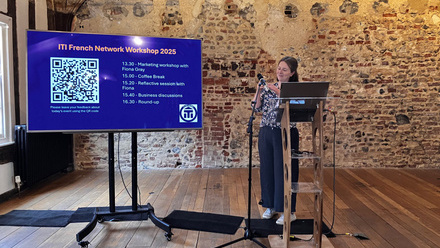Why good presentation skills are essential for interpreters
Nathaniel Elcock MITI reflects on why good presentation skills are essential for interpreters and what he learned in two recent webinars on the subject.
I have long been of the opinion that good presentation skills are often undervalued in the interpreting profession (and many professions, for that matter). Sure - we all know that you need a solid command of the source language, a rock-solid target language and highly attuned analytical skills in between. But I think that students of interpreting could often do with better training in some of the ‘softer’ skills which they will need in the profession. And I also think that some practising interpreters do not fully realise the benefit of sound presentation skills.

I am talking about the ability to project confidence even when you’re quaking in your boots! I am talking about voice control. I am talking about the ability to hold an audience by the way you deliver your message (perhaps particularly important in consecutive mode). I am talking about the ability to ‘get into the mind’ of the speakers you interpret, and mirror (or even improve on - controversial!) their delivery; and with all this, to be able to sympathetically adapt your delivery to the particular circumstances you find yourself in. And, by the way, none of this changes or goes away just because we are all meeting online at the moment.
With all this in mind, I recently decided to attend two webinars on presentation skills. One of them was brilliant. But the other was very poor indeed – possibly the worst training workshop I have ever attended. And no, I’m not going to tell you where I found it or who was behind it!
What made it so bad? I guess it became clear early on that the trainer was breaking many of the rules she was teaching attendees to adhere to. It is very hard to take a presentation skills trainer seriously when they have uninspiring delivery, poor slides and an opaque structure. To top it all off, attendees were asked for feedback at the end, but their names were collected alongside the feedback. This necessarily puts a limitation on the sincerity and usefulness of the comments, as people often don’t want to put their name to written criticism. If you’re not careful, all you get is a bland “Thanks for the session”.
The other webinar, by contrast, was fresh, fast-paced, and entirely consistent with itself (and with every other workshop I have ever been to on the subject). This gave credibility to the presenters, and I left the webinar with a list of tips and tricks to try out in my own (online) presentations. Here are a handful for you to consider:
- If presenting online, use a green screen and a program like OBS (which is free) to insert a professional background behind you.
- Again, if online, use a headset (ideally USB with noise cancellation).
- Consider having a co-presenter; this gives variety, enables one presenter to take over if the other is struggling, and is generally much more engaging if done well.
- Keep PowerPoint slides simple and visually strong! Less really is more. Let the slides tell the story; don’t spell it out laboriously. If people are reading text, they are not listening to the speaker!
- If online, increase audience engagement with polls, shared whiteboards and breakout rooms, for example – but make sure your use of these tools is purposeful. No-one likes a pointless discussion or quiz question.
- Invite comments and questions in the chat - and monitor it closely. This is another reason to use two hosts; one manages the chat while the other keeps the session moving.
So, what is the moral of this story? Firstly, presentation skills matter (especially if you are presenting about presentation skills)! Surely, as professional communicators, we should all care about this and be seeking to improve here.
And one final thing: if you are running any kind of session, and you want to know what people really thought, make sure you give them the chance to give feedback anonymously!
Presenting well in person and online is one of my main areas of interest, and I would have loved to say more. Feel free to contact me on Twitter or LinkedIn if you’d like to discuss anything on this topic. I wish you every success as we all continue to work through these testing times.
About the writer

Nathaniel Elcock is a trained conference interpreter and translator with ten years’ experience. He is a Client Success Representative at multilingual web-conferencing provider, KUDO, and part-time Associate Lecturer in Translation at the University of York. He is a Qualified Member of ITI and sits on their Professional Development Committee.






